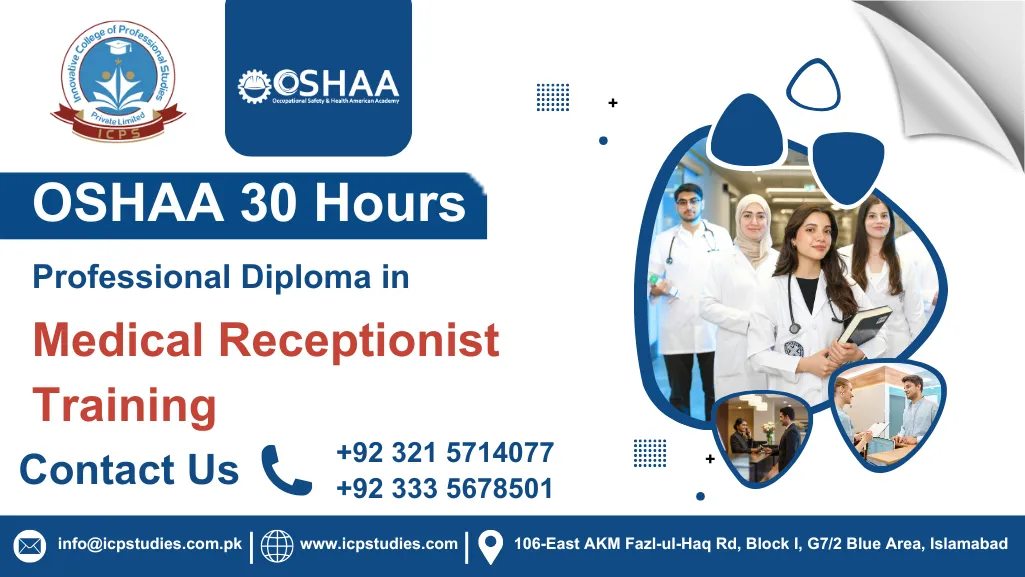A medical receptionist plays a crucial role in the smooth operation of healthcare facilities, acting as the first point of contact for patients and ensuring efficient administrative processes. The OSHAA 30-Hours Professional Diploma in Medical Receptionist Training is designed to equip individuals with the essential skills and knowledge required to excel in this vital role. OSHAA 30-Hours Professional Diploma in Medical Receptionist Training provides a strong foundation in medical administration, patient communication, and healthcare regulations, preparing participants for a rewarding career in the healthcare sector.
Medical receptionists are responsible for managing front-desk operations in hospitals, clinics, and other healthcare settings. OSHAA 30-Hours Professional Diploma in Medical Receptionist Training duties include scheduling appointments, handling patient records, processing insurance claims, and ensuring a welcoming environment for patients. Given the fast-paced nature of healthcare, medical receptionists must be organised, professional, and able to handle sensitive information with discretion.
The OSHAA 30-Hours Professional Diploma in Medical Receptionist Training is an excellent opportunity for individuals looking to start or advance their careers in healthcare administration. With a strong focus on professionalism, patient care, and organizational efficiency, OSHAA 30-Hours Professional Diploma in Medical Receptionist Training provides the essential training needed to thrive in the medical receptionist role.
All About OSHAA 30-Hours Professional Diploma in Medical Receptionist Training
Course Overview
Welcome to the OSHAA 30-Hours Professional Diploma in Medical Receptionist Training — an intensive program designed to equip you with all the essential skills, knowledge, and practical insights needed to perform as a competent medical receptionist in modern healthcare settings.
Over 30 hours, you will cover both the theory and hands-on aspects of medical receptionist duties including communication with patients, managing appointments, record keeping, billing basics, and ensuring compliance with healthcare confidentiality and data protection standards.
Medical receptionists are often the first point of contact for patients. How well the reception is managed affects patient satisfaction, efficiency of clinical operations, and the overall reputation of a practice or facility. With increasing emphasis on digital record-keeping, patient privacy, insurance and billing complexities, there is strong demand for trained receptionists who are not just good with people, but also skilled with systems and procedures.
Study Units
- Overview of Medical Receptionist Responsibilities
- Effective Patient Communication and Customer Service
- Managing Appointments and Scheduling Systems
- Patient Registration and Data Entry Procedures
- Medical Record-Keeping and Electronic Health Records (EHR)
- Basics of Medical Billing and Insurance Processing
- Data Protection, Confidentiality, and Patient Rights
- Workplace Health and Safety Regulations in Healthcare
To enroll in the OSHAA 30-Hours Professional Diploma in Medical Receptionist Training, learners should meet the following requirements:
- Minimum Education: Applicants should typically have at least a high school/secondary school qualification (Matric or equivalent). Good literacy and numeracy skills are needed because the role involves forms, records, and billing.
- Language Skills: Basic proficiency in English is recommended since medical terms, records, and most training materials are in English. (Local language fluency is also an advantage for patient communication.)
- Computer/IT Awareness: Basic knowledge of computers and common office software is desirable, as scheduling and records are increasingly digital.
- Age Requirement: Generally 18 years or older at the time of enrollment.
- Work Experience: Prior experience in customer service, office administration, or healthcare support is helpful but not mandatory. Fresh candidates aiming to enter the healthcare administrative field may also apply.
- Soft Skills: Good communication, empathy, and organizational skills are considered beneficial.
- Individuals who wish to start a career as a medical receptionist in hospitals, clinics, diagnostic centres, or private practices.
- Current front-desk or administrative staff in healthcare facilities looking to formalize their skills and gain a recognized diploma.
- Career changers from other customer-service or office roles who want to enter the healthcare administration field.
- Healthcare support staff (nurses’ aides, ward clerks, volunteers) who also perform patient interaction and reception duties and want structured training.
- Students interested in healthcare administration as a pathway to roles such as medical secretary, patient services coordinator, or clinic administrator.
Learning Outcomes
By the end of OSHAA 30-Hours Professional Diploma in Medical Receptionist Training, learners will be able to:
- Demonstrate professional front-desk conduct by greeting patients, handling inquiries, and maintaining a welcoming reception area.
- Manage appointment and scheduling systems efficiently, including bookings, cancellations, and follow-ups to ensure smooth patient flow.
- Accurately register and maintain patient records, both paper-based and electronic, in compliance with confidentiality and data protection regulations.
- Apply basic medical billing and insurance procedures, including processing invoices and understanding common medical coding terms.
- Communicate effectively with patients and healthcare staff, using clear, empathetic, and culturally sensitive language.
- Identify and follow workplace health and safety procedures relevant to the reception area in healthcare settings.
- Use basic office technology and software tools common to medical reception work (scheduling systems, EHR, spreadsheets, etc.).
- Understand the ethical and legal responsibilities of a medical receptionist within a healthcare organization.
FAQs OSHAA 30-Hours Professional Diploma in Medical Receptionist Training

